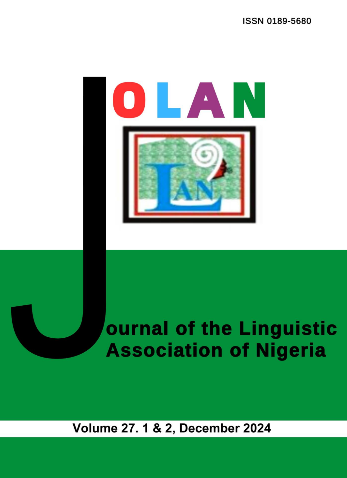The Semantics of Yoruba Presupposition Triggers
Keywords:
Yoruba, Information Content, Entailment, Presupposition, SemanticsAbstract
There is a dearth of works on formal semantics study of African languages. This paper investigates the semantic relation of presupposition in the light of relevant data from the Yoruba language. Employing formal semantics approach, the paper does not only identify Yoruba presupposition triggers but also investigates the extent to which they exhibit their triggering properties. The study shows that the negation of the set of propositions having the additive presupposition trigger, náà, cannot entail such propositions but their corresponding negations. It also shows that the interpretation of certain factive verbs in the language may result in presupposition failure in contexts where the experiencer referent in the main clause is not co-referential with the subject of the embedded complementizer (pé- ) clause. It equally shows that the presupposition triggered by the preverbal item sì ‘still, again’ may be entailed or non-entailed; and survives under negation by entailing the negated form of the concerned preposition.
References
Ajiboye, O. (2015). The morpho-syntax of genericity in Yorùbá. In O. Orie, F. Ilọri and C. Yuka (eds.) Current research in African linguistics: Papers in honour of Oladele
Awobuluyi. 251-270. Newcastle: Cambridge Scholars Publishing
Austin, J. (1962). How to do things with words. Oxford: Oxford University Press.
Dayal, V. (2013). Semantics. Third African linguistics school handout. Ibadan: Lead City University.
Erteschik-Shir, N. (2007). Information structure: The syntax-discourse interface. Oxford: Oxford University Press.
Gazdar, G. (1979). Pragmatics: Implicature, presupposition and logical form. New York/San Francisco/London: Academic Press.
Goldstein, S. (2019). Generalized update semantics. Mind Vol. 128(511): 795-835, https://doi.org/10.1093/mind/fzy076
Goldstein, S. (2017). Informative dynamic semantics, PhD thesis, Rutgers University.
Grice, P. (1975). Logic and Conversation. In P. Cole and J. L. Morgan (Eds.), Syntax and Semantics Vol. 3, Speech acts (pp. 41-58). Academic Press.
Ilori, J. (2018). Interrogative projections in Yoruboid languages. Journal of West AfricanLanguages, 44(1), 1-21.
Nouwen, R., Brasoveanu, A., van Eijck, J. and Visser, A. (2016). Dynamic Semantics. In E. N. Zalta and U. Nodelman (eds.) The Stanford Encyclopaedia of Philosophy. https://plato.stanford.edu/archives/win2016/ entries/dyna mic- semantics/
Palmer, F. (1981). Semantics. Cambridge: Cambridge University Press.
Partee, B. H., Meulen A. T., and Wall, R. E. (1990). Mathematical methods in linguistics. Dordrecht/Boston/London: Kluwer Academic Publishers.Karttunen, L. (1974). Presupposition and linguistic context. Theoretical Linguistics, 1, 181–194.
Kripke, S. (2009). Presupposition and anaphora: remarks on the formulation of the projection problem. Linguistic Inquiry 40(3): 367-386.
Rooth, M. (1992). A theory of focus interpretation”. Natural Language Semantics 1: 75-116.
Stalnaker, R. (1973). Presuppositions. Journal of Philosophical Logic 2, 447–457.
Stalnaker, R. (1978). Pragmatic presupposition. M. K. Munitz & P. Unger (Eds.) Semantics and philosophy (pp.197-213). New York University Press. van
der Sandt, R. (1992). Presupposition projection as anaphora resolution. Journal ofSemantics, 9, 333–377.
van der Sandt, R. & Geurts, B. (2001). Too. In R. van Rooij & M. Stokhof (Eds.), Proceedings of the 13th Amsterdam colloquium (pp. 180-185). Amsterdam: Institute for Logic, Language and Computation.
von Fintel, K. and Mathewson, L. (2008). Universals in Semantics. The Linguistic Review 25: 139-201.
Zeevat, H. (2003). Particles: presupposition triggers, context markers or speech act markers. In R. Blutner & H. Zeevat (Eds.), Optimality theory and pragmatics (pp. 91-111). Palgrave-McMillan
Zeevat, H. (2002). Explaining presupposition triggers. In K. van Deemter and R. Kibble (Eds.), Information sharing: Reference and presupposition in language generation and Interpretation. (pp. 61–87). CSLI Publications.
Zehr, J. and Schwarz, F. (2016). Entailed vs. non-entailed presuppositions - An experimental assessment. 45th. North East Linguistic Society Conference held at Massachusetts Institute of Technology, October 31 to November 2.
Zimmermann, T. & Sternefeld, W. (2013). Introduction to semantics: An essential guide to the composition of meaning. Berlin: De Gruyter Mouton.














